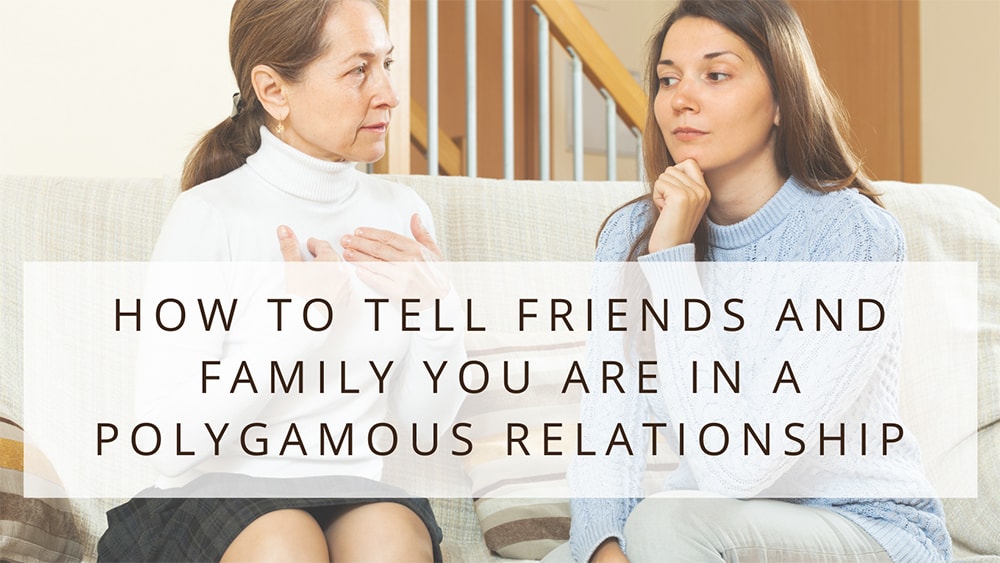

How To Tell Friends And Family You Are In A Polygamous Relationship

If your friends and family have ever only seen you in monogamous relationships, it can seem like a big deal to have to tell them that you are interested in polygamy. If you're in a serious polygamous relationship, the task of telling your friends and family can be even more daunting.
Here are a few tips to help make the conversation about polygamy go as smoothly as possible.
Decide when to tell them
When you tell your friends and family about your interest in polygamy can greatly affect how they respond to the news. But, there are advantages to having the conversation early as well as waiting until you are more sure of your plural relationship.
If you start dropping hints and initiating conversations about how you find the idea of polygamy dating and plural marriage interesting early on, perhaps even before entering a relationship, it gives you plenty of time to gauge their response and give them an idea that you are leaning toward becoming a polygamist. The disadvantage of this is that it can invite a lot of drama into your life before you have even started dating anyone, decided that a plural marriage is right for you, and before you know if you will be successful in meeting your spouse.
Before you are involved in a plural relationship, it's easy for your friends and family to think that you are not very serious about polygamy, are going through a phase, have joined a religious cult, or are becoming polyamorous. Rather than being supportive, they are likely to wonder what is wrong with you for looking for happiness in a relationship structure other than monogamy. The funny thing is, a lot of times the people trying to talk you out of polygamy are single or not happy with their own monogamous relationship.
The other approach, and the one that we prefer, is to not have any meaningful conversations about polygamy until after you are in a serious polygamous relationship.
If are having the conversation when you have already met your sister wife, or when you are going to become one and join a polygamist family, the conversation will naturally be different. You can explain that you didn't discuss it before because you knew they would think it was unorthodox but that you are happy and feel like the relationship is right for you.
While some of their concerns will remain the same, they will know from the beginning that you are serious and see your relationship in front of them rather than make incorrect assumptions about what real-life polygamy would look like.
It also makes it easier to weed out those that truly support your happiness from those that will only support you if you live your life their way. While you should expect your friends and family to have concerns and questions, they should all be from a perspective of wanting to be as sure as you are that a polygamous relationship is right for you.
Be prepared to answer questions about polygamy
Your friends and family are likely to have a lot of questions about your relationship. They may want to know how you met your partners, how and why you decided you wanted to have a polygamous relationship, and how it works on a day-to-day basis. It's important to be patient and open when answering these questions, as this will help your loved ones better understand and accept your plural relationship.
You shouldn't put up with anyone that seems fast to judge before seeing if the situation is good for you. At the same time, people that care about you may ask pointed questions at times.
Be honest about your feelings
It's important to be honest about your feelings when talking to friends and family about your polygamous relationship. Being honest will help your loved ones understand how you're feeling and why you've made the decision to become a polygamist.
Be prepared to honestly discuss why you developed an interest in polygamy and decided it was right for you. Most polygamists have very clear, and sometimes deeply personal, reasons for wanting a polygamous relationship. While these things may be hard to discuss openly, it's worth it to have the support of your loved ones.
Some people may not understand how love works in polygamy. They may think that because there is more than one partner, the love must be spread thin. It's important to explain that while there may be challenges associated with dividing your time and attention among multiple partners, the love itself is not diluted. In fact, some people find that they are able to love more deeply in a polygamous relationship than they ever could in a monogamous one.
Be prepared for mixed reactions
Your friends and family's reactions to your news will likely be mixed. Some people will be accepting of polygamy and supportive, while others may react with anger, disappointment, or confusion. It's important to remember that everyone reacts differently and to give people the time they need to process the news.
If you're met with negative reactions, try to stay calm and explain why you believe a polygamous relationship is right for you. It's also okay for them to disagree, as long as it's done with respect for you. Not everyone has to understand or agree with your decision in order for you to be happy in your relationship.
What's most important is that you have the support of your partners. They are the ones that truly matter in this situation and will be there for you no matter what your friends and family say or do.
Even if you think you know how someone will react to your news, it's always possible that things will go in a different direction. People may say or do things that you weren't expecting, either being unexpectedly supportive or discouraging, so it's important to be prepared for anything.
The most important thing is to stay true to yourself and your partners. Do what feels right for you and don't let anyone pressure you into doing anything that makes you uncomfortable. You deserve to be happy in your relationship, no matter what others may think or say.
It's important for your partners to be patient during this time, as well. They should understand that it may take some people longer than others to come around and accept your plural relationship.
Involve your partners
You will most likely not want your partners to meet your friends and family until you have given time for everyone to process the news and come to terms with it themselves. But, you will want your partners to be involved in what's going on and how the news is received as they can provide support and understanding.
You will want to introduce your partners to your most supportive friends and family members first. Not only will they help to make things smoother with everyone else, but getting over the first introductions will help boost your confidence before meeting with people that may be more difficult.
Don't be afraid to let your partners answer any questions your friends or family may have about polygamy. Hearing their response and how you are as a throuple will be a major part of helping others understand and accept your polygamous relationship.
Take things slow
You don't have to share every detail of your relationship with your friends and family all at once. It's okay to take things slow and give people the time they need to adjust.
You can start by simply telling them that you're in a polygamous relationship and leaving it at that. If they have questions, you can answer them as best you can, but don't feel like you need to share everything right away.
As time goes on and those around you start to become more comfortable with the idea of polygamy, you can slowly open up more about your plural relationship and what it means to you.
Be understanding
Your friends and family are going through a lot of changes too, so it's important to be understanding of their reactions, even if they're not always supportive. It takes time for people to adjust to new situations and they may not always handle things the way you want them to.
It's okay to give people space if they need it and continue to be there for them when they're ready to talk about polygamy.
Remember, you're not alone
There are many other people in polygamous relationships and you can reach out to them for support and advice. There are also numerous online resources that can be helpful, such as polygamy blogs, forums, and support groups for plural marriage.
Reaching out to others in similar situations can help normalize your polygamous relationship in your own mind and make it easier to talk about polygamy with friends and family. It can also give you some great ideas on how to handle difficult situations.
